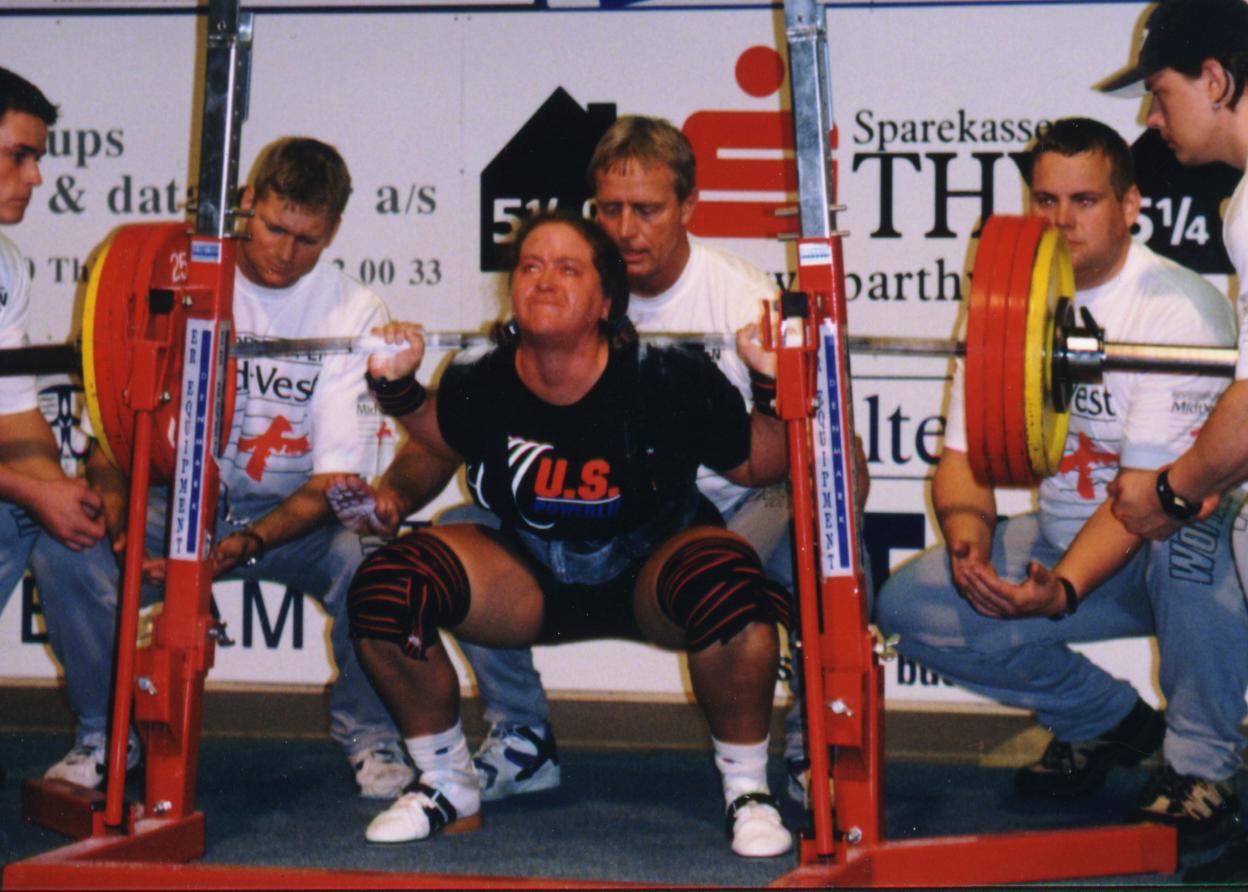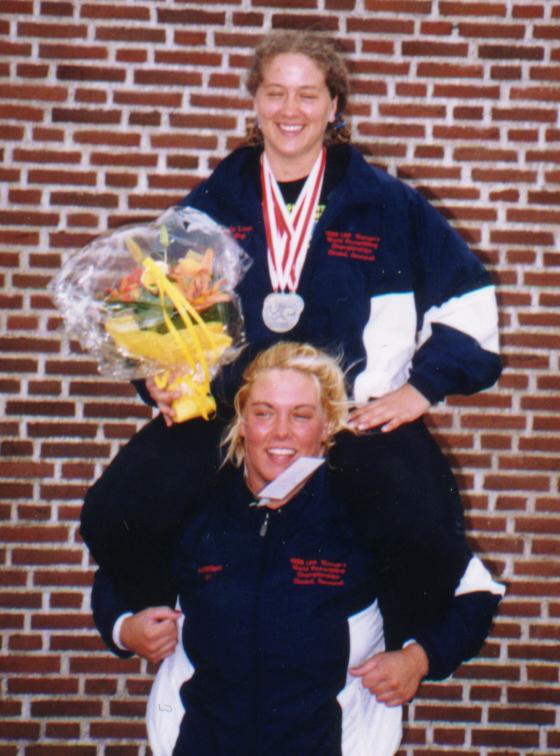 |
|||||||||||||||
|
|||||||||||||||
| Interviewed by: Deepsquatter
Q: Can you give us some background info on yourself (age, education, occupation, funny middle name, etc.)? LL: I am 28 years old. I have a Bachelors degree in Kinesiology and Physical Education with a concentration in Health. I teach at a boyís residential school and love it. Iím currently deciding which Masterís degree program would be best for me. Q: How did you get involved in powerlifting? LL: My powerlifting journey began at age 16. One rainy day my gym teacher, Ann (Turbyne) Andrews, brought in a video of her winning the World Championships in 1980. I was intrigued, so I asked her some questions. There was a State meet in 3 weeks and the gym she lifted for, Gillyís Gym, needed someone in the 181ís. I was a steady 173 so I learned the basic three, equipment, & rules and entered my first meet, the 1989 Maine State Championships. Q: What is your favorite lift? Least favorite? LL: I can honestly say I donít have a particular favorite. I have favored the squat or deadlift over the years but having all three lifts is a good balance both mentally and physically. I think I train my squat the hardest consistently. I need to make more of an effort with shoulders and biceps. Although I enjoy training my bench now, for years it was a struggle. Itís frustrating to be so inadequate at it. Q: What are your best lifts? The ones you're most
proud of? Titles
LL: My best contest lifts
come over 3 weight classes. Here it goesÖ
My deadlift is probably my best lift although itís strength has been compromised in contests either because of my back squatting style or grip issues. I would like to be able to show my true strength in the deadlift. Iím most proud of my 479 squat at 198. That was a hard push and I made it. It also happened at my last Jr. Nationals where I went 9/9 and totaled over 1200, a fond memory. It would make my day if Mr. Jasper would send me a copy of the video (shameless plug). Iím also proud to say that Iíve been a consistent, loyal, IPF lifter who understands the value of judging, doping control, and equipment regulations along with lifting with strong competitors. Iím pleased that I endured a total knee reconstruction & came back to be competitive. The icing on the cake will be when I get a PR squat & total. My titles are as followsÖ
Q: Any meets you'd like to 'do over' or take back? LL: No. Iíve learned from my screw-ups. Take away these and I havenít learned. Therefore, Iíd have to screw up all over again. No thanks! If what youíre looking for are my shittiest moments they would have to be the 1990 Region I (4/9 way too mental), 1997 Womenís Seniors (6/9 way too insecure over my surgery), and the 1998 Womenís Worlds (4/9 totally screwed up my diet). Q: What are your future goals in the sport? How good can Leslie Look be? Are you "THAT DAMN GOOD?" LL: My future goals are to keep my body healthy and make a good transition from training hard to training hard & smart. As far as weights go Iíd like to squat 485+, bench 286+, and pull over 500 at 181. As far as how good I can be, weíll see. I donít like to write checks with my mouth my ass canít cash. That docket is already full in this sport. However, I donít lift to be ďNOT SO DAMN GOODĒ. Q: Let me switch gears a bit. You seem to be the
voice of female lifting for USAPL, at least in PLUSA. How do you think
we can get more ladies into powerlifting? I see more women at the gym these
days but even the ones that venture into the free weight area seem to feel
that heavy lifting is for guys. The word "tone" is used way too much. How
can we
LL: There are many voices in womenís powerlifting. Mine does not exemplify all of them. Iím unsure how to ďsellĒ powerlifting to the female population. I think that as a general rule women associate lifting heavy weights with being a thickly muscled brute. Although this seems to be socially desirable for men, for women itís not always so well received. Big, strong women have their place in powerlifting but they certainly donít portray everything womenís powerlifting is about. No one weight class or body type could do that. Strong women come in all shapes and sizes ranging from petite to robust. When society realizes this and stops pigeonholing strong girls into a negative misnomer Iím sure strength sport will be seen as more desirable. Q: What about supplementation? What kind of diet and supplement regimen do you follow? LL: Iím not on a special
supplementation program. Diet is probably the weakest area of my training.
This is my next area of attack. Some of the good choices I make are
getting enough protein, about ¾ of a gram per pound of body weight
a day. I keep my protein levels high by eating bars and drinking
shakes. Iím currently looking for a nutrition sponsor. Iíve
been working on my water intake, trying to increase it to 100 ounces daily
in addition to other fluids. I take a multi-vitamin each day along
with glucosamine and chondroitin for my joints.
Q: What is your out of contest weight? Ok, you don't have to answer that but do you stay at or near your weight class limit year round or do you train above it and cut weight for meets? I know we're not supposed to ask women their weights but hey, it's for training. LL: My out of contest weight ranges from 183-192. I tend to train above my weight class limit and cut weight for contests. This parallels my response to your earlier question. It would be better to train lighter. Q: Who has influenced you in this sport? Helped you the most? LL: There have been many influences to my training. The people that have helped me the most are those that have stuck by me. My mom and Nan are two of the strongest, toughest women Iíve ever met. Although they are not directly involved in my training, their contribution to my personality and life have been tremendous. Their genetics arenít too shabby either. Other, more gym-related influences have been the Gillyís Gym atmosphere, very hardcore and encouraging (in my early years); my many training partners and helpers over the years: Guy, Heather, Tammy, Johnny G, Glen, Michael, Mike, Chris, & Sean; Shelby Corson- a strong, emulator, Carrie Boudreau- an unbelievable athlete and true encourager; John Mathieu- a caring supporter and incredible knee wrapper; Pete Alaniz- a super sponsor; Hammond Lumber Company- a valuable contributor; Larry Maile- a super coach with true respect for womenís powerlifting; and Lizzy Willett- one hell of a cool lady. Q: The Strength Site is about training. Would you share some of your training ideas with the readers? LL: I keep my routine pretty basic. I lift 4 days a week. Day 1- Squats/legs, Day 2- Bench I (bench press, chest, triceps), Day 3- Deadlift/back/ light legs, Day 4- Bench II (shoulders, biceps). On off days I train abs and do cardio to stay healthy and maintain weight. My newest idea is to train my upper back and chest on Day 4 (with shoulders and biceps on day 2) to try to balance out some postural issues that have developed after years of training. I also plan to flip my deadlift grip to develop my back more evenly. I have been referred to as uncoachable. That may be true, I certainly donít do what Iím told, when Iím told to do it. However, I think this makes me a discerning learner. Some key training elements that have worked for me over the years are as followsÖ
LL:
Lift for a federation you can feel good about. Check out their rules, equipment guidelines, & doping control. Be educated.
Reproduction of this article, in whole or part, for any purposed other than personal use is prohibited without written consent. Copyright 2001 Deepsquatter. com |


